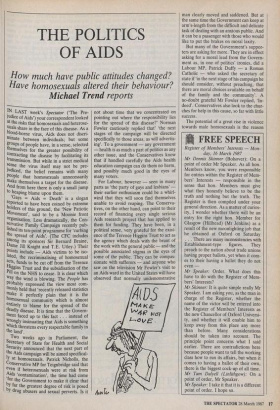THE POLITICS OF AIDS
How much have public attitudes changed? Have homosexuals altered their behaviour?
Michael Trend reports IN . LAST week's Spectator (The Pre- judice of Aids') your correspondent looked at the risks that homosexuals and heterose- xuals share in the face of this disease. As a blood-borne virus, Aids does not discri- minate between individuals; but some groups of people have, in a sense, selected themselves for the greater possibility of Contracting the disease by facilitating its transmission. But while in a strict medical s.ense the virus itself may not be pre- judiced, the belief remains with many people that homosexuals unnecessarily make themselves a target for the disease. And from here there is only a small jump to heaping blame upon them. 'Gays = Aids = Death' is a slogan reported to have been coined by extreme holders of this ground, the 'New Patiotic Movement', said to be a Moonie front organisation. Less dramatically, the Con- servative Family Campaign recently pub- lished its ten-point programme for 'curbing the spread of Aids'. (The CFC includes among its sponsors Sir Bernard Braine, Dame Jill Knight and T.E. Utley.) Their Points include — Aids victims to be iso- lated, the recriminalising of homosexual acts, funds to be cut off from the Terence Higgins Trust and the subsidisation of the Pill on the NHS to cease. It is clear which way the wind is blowing. The People has Probably expressed the view most com- monly held that 'recently released statistics make it perfectly plain that it is the homosexual community which is almost entirely to blame for the spread of the deadly disease. It is time that the Govern- ment faced up to this fact . . . instead. of wrongly insinuating that Aids is something Which threatens every respectable family in the land'.
Two weeks ago in Parliament, the Secretary of State for Health and Social Security announced that the next part of the Aids campaign will be aimed specifical- ly at homosexuals. Patrick Nicholls, the Conservative MP for Teignbridge said that even if heterosexuals were at risk from Aids 'contamination', the time had come for the Government to make it clear that by far the greatest degree of risk is posed by drug abusers and sexual perverts. Is it not about time that we concentrated on pointing out where the responsibility lies for the spread of this disease?' Norman Fowler cautiously replied that' the next stages of the campaign will be directed specifically to those areas, as will advertis- ing'. To a government — any government — health is as much a part of politics as any other issue, and the Conservatives know that if handled carefully the Aids health education campaign can do them no harm, and possibly much good in the eyes of many voters.
For Labour, however — seen in many parts as 'the party of gays and lesbians' — their earlier enthusiasm could be a whirl- wind that they will soon find themselves unable to avoid reaping. The Conserva- tives, on the other hand, can point to their record of financing every single serious Aids research project that has applied to them for funding. They have been, in a political sense, very grateful for the exist- ence of the Terence Higgins Trust to act as the agency which deals with the brunt of the work with the general public — and the possible associated stigma in the eyes of some of the public. They can be compas- sionate with sufferers — and anyone who saw on the television Mr Fowler's visit to an Aids ward in the United States will have observed that normally undemonstrative man clearly moved and saddened. But at the same time the Government can keep at arm's-length from the difficult and delicate task of dealing with an anxious public. And it can be a passenger with those who would like to put the brakes on moral laxity.
But many of the Government's suppor- ters are asking for more. They are in effect asking for a moral lead from the Govern- ment as, in one of politics' ironies, did a Labour MP, Patrick Duffy — a Roman Catholic — who asked the secretary of state if 'in the next stage of his campaign he should consider, without preaching, that there are moral choices available on behalf of the family and the community'. A no-doubt grateful Mr Fowler replied, 'In- deed'. Conservatives also look to the chur- ches for help in this cause, so far with little success.
The potential of a great rise in violence towards male homosexuals is the reason for the Government's caution so far — a revival of 'queer-bashing', but on a vastly increased scale. Homosexual acts between consenting adults in private were legalised in the 1967 Sexual Offences Act. The trouble is that a vast increase in prom- iscuous male homosexual behaviour was precisely what the Act did not have in mind. Lord Arran, a prime mover of the Bill, put it thus: 'I ask those who have, as it were, been in bondage and for whom the prison doors are now open to show their thanks by comporting themselves quietly and with dignity'. In language and intent it seems another world now.
As for homosexuals themselves, there is now real evidence that they have modified their sexual habits. Studies in both Los Angeles and London show that the inci- dence of other sexually-transmitted dis- eases in homosexuals, which have been monitored for some years, is decreasing. This implies that the level of sexual activity among homosexuals has generally declined and may be accounted for by the fear of Aids. For example, between 1983 and 1986, the number of homosexual male patients attending the Praed Street Clinic with male rectal gonorrhoea fell by 53 per cent (Lancet, 16 October 1986).
This week's Lancet contains further evi- dence along these lines. The Middlesex Hospital also now reports a fall in cases of gonorrhoea among homosexuals and bisex- uals from more than 15 per cent of those attending the clinic to just over five per cent in the past five years. Moreover, it has compiled figures showing that from its own cases the rate in the rise of infection by Aids is slowing down. This was also the experience in the United States, but seems to be happening here at an earlier stage in the epidemic than across the Atlantic. The report suggests that 'safer sex' practices are becoming more common and the average number of sexual partners in the study has fallen — from three to one per month.
There are other indications that homosexuals in both the United States and Britain are changing their behaviour and social habits. In America's urban homosex- ual enclaves many businesses that catered mainly for homosexuals — such as the notorious 'bathhouses' — have closed down due to changing habits. The emph- asis now has moved away from places where homosexuals could pick each other up — 'cruisy meat racks', as the latest issue of the American homosexual magazine the Advocate puts it. Instead much more 'nest- ing' is taking place and there has been a boom in areas such as home videos. But this being America, someone has seen the commercial opportunity: the managing editor of San Francisco's Gay Book busi- ness directory, a man likely to benefit from the new habits, observes that 'the changing patterns of gay male social behaviour are making the gay community a more attrac- tive market segment'. There are now signs that the same sort of change is being seen among homosexuals in London. A male striptease artist called Streethawk is the main feature in the current issue of the British publication Gay Times. In an inter- view he observed: 'It's hardly surprising that in an Aids-Age, striptease is catching on fast; vicarious sexuality is, after all, the safest sex of all'.
But the homosexual activists have their own politics also. From reading the current homosexual press, one would be forgiven for getting the impression that Aids was only a minor issue to homosexuals in terms of public health. In the current issue of Gay Times, the lengthiest article on the subject is a joke piece, 'Which condom?' — 'The Sir Robert Mark', the 'Oliver Reed', the 'Vatican' and so on. And in a recent book, The Truth about the Aids Panic (published by Janius), Dr Michael Fitzpatrick and Don Milligan lay out the radical homosexual view: 'It is the oppres- sion of homosexuals that allows HIV infec- tion to spread among gay men' (their italics). 'Combating the Aids scare means fighting for the equal treatment of homosexuals in society, and for the unity of the working class against divisive moral- ism and phoney public health propaganda.' Here the health authorities clear!y have an uphill task.



















































 Previous page
Previous page